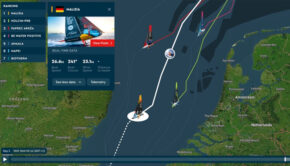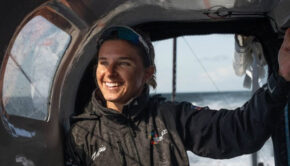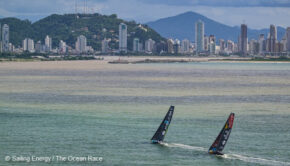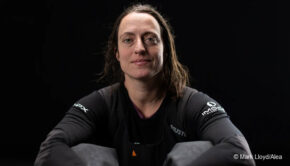Optimism for IMOCA and The Ocean Race
Published on July 1st, 2023
There were only five boats in the fleet, but the inaugural IMOCA participation in The Ocean Race had drama a-plenty on the water and off it, including dismastings, a big crash, days of compelling racing, plus extraordinary speed that produced a new monohull 24-hour distance record, and finally a worthy winner in 11th Hour Racing Team.
Antoine Mermod, the President of the IMOCA Class, who championed the Class’s involvement in the race, has been impressed by what the teams have achieved on the global racecourse over seven legs since the start in January at Alicante, Spain.
“I would like to offer huge congratulations to the five teams that did this race, because it was very hard for the sailors and it was incredibly complicated and tough for the shore teams who worked day and night at the very short stopovers,” noted Mermod at the finish in Genova, Italy.
“I would also like to recognize the contribution by the Onboard Reporters, who told the story in a way that we have never seen before, and I think all the people who have participated in this story will remember it for a very long time. It has been a very good first race for IMOCA in The Ocean Race.”
Mermod says the race has established that the IMOCA fleet, sailing fully-crewed, and The Ocean Race are a great combination.
“I am super-happy about it because when you change something – when you build something new – it is always a challenge with a lot of unknowns,” he said. “But we have shown that, technically speaking, the boats are at a level to do this race.
“And we also learned a lot about how to improve them, but also about reliability, about the way to sail the boats, about the fatigue of many components – there has been a huge amount of information from the race. On the sporting side, meanwhile, we had a great race with a lot of different winners in the legs and in the In-Port races.”
Team Malizia did not win The Ocean Race, but they still had what they call their “pinnacle moments” – repairing their mast in the Indian Ocean, then winning the epic Leg 3, setting a new 24-hour distance world record and winning Leg 7. They also took to the challenge of sharing their experiences with a growing audience on shore with great skill and enthusiasm.
Team manager Holly Cova says the race takes over your life. “I really think it is an amazing, amazing race to do. The Ocean Race gets under your skin and you can’t let go of it.
“But it’s true – you become so close to the other teams and you learn a lot from each other. You also learn so much about your boat – you break everything there is to break and you repair it so fast.
“And I think for the shore team, they learn so much because they are having to do something in such a short amount of time which normally you would never imagine. And from a purely communications point of view, you are going to places that on the French IMOCA circuit you would never get to experience and you would never have that reach. So, for partners as well, it is just incredible.”
Cova says the secret of success in this event is the strength of a team that needs to bond tightly together to deal with all the challenges the race can produce.
“Being close as a team is the key because you really do put everything into this. I mean the whole team, every single person, not just the sailors but everyone – 40 people. The sailors have one role to play and of course it is a really important one, but they don’t get anywhere without everyone else in the team. Every single person, from the most junior to the most senior, plays such an important role.”
Paul Meilhat, skipper of fourth-placed Biotherm, says The Ocean Race is for people who want change and new experiences.
“Benjamin Dutreux, Boris Herrmann, and I have always wanted change,” he said. “So if I had to say why we did this race, it would be to do something different, and a change from what we are used to, and to enrich ourselves and discover new things from everywhere.
“The organization is new, sailing with a crew is new, and going to different countries is new. Everything is new – the Pro-Ams, the In-Port races, the teams and the team bases, and I think that’s great.
“Also you get to experience some very strong emotions – unlike in solo races, you are much more involved in sharing your feelings and emotions, and you experience seven starts, seven finishes, seven In-Port races – it’s enormous.”
Like Cova, Meilhat believes the strength of a team is a vital ingredient in any The Ocean Race campaign.
“You have to take only the best players, but also those who are going to get on and work well together for six months. And you have to take people who really want to do it, especially not people who don’t want to travel or do anything out of the ordinary. It’s a race for the extraordinary, so you need people with a passion for it.”
At 11th Hour Racing Team, winners of the 50th anniversary The Ocean Race, CEO Mark Towill is hoping that the success of this event will encourage the Class to expand its offer of fully-crewed events.
“I am optimistic, or at least hopeful, that there can be a solo or double-handed schedule, and then a fully-crewed schedule within the class, that will allow teams that are more Anglo-Saxon, or Ocean Race focused, to have events that they can do on an annual basis.”
Mermod is thinking along the same lines. “My goal is to open, as much as possible, opportunities for skippers, for crews, and for partners,” he said. “We are opening new markets for partners that are more international. We are introducing another way of sailing for teams who are not focused on short-handed events.
“And I think for the whole business, it’s very important having opportunities from which teams can choose. So the signs are very positive. The Vendée Globe is the top single-handed race in the world and The Ocean Race is the top race for crews – we can be very proud about having the two biggest races in the world in our calendar.”
In the meantime, the focus now switches back to the IMOCA GLOBE SERIES Championship and a busy season ahead, continuing (after the Guyader Bermudes 1000 Race in May) with the two-handed Rolex Fastnet Race in late July, then the Défi Azimut-Lorient Agglomération, the Transat Jacques Vabre, and finally the solo Retour à la Base.
Mermod says the two transatlantics are big milestones on the way to the 2024 Vendée Globe, as the two-handed season comes to an end and the skippers return from the Caribbean alone.
“We can say that, in these races, we will have more or less all the boats that will compete in the next Vendée Globe with all the skippers on their boats, first sailing two-handed and then coming back single-handed,” he said. “It will be a big moment for the Class and I think the Retour à la Base will start to tighten the focus on the next Vendée Globe which is very exciting.”
Race details – Route – Tracker – Scoreboard – Content from the boats – YouTube
IMOCA Final Results
1. 11th Hour Racing Team — 37 points
2. Team Holcim-PRB — 34 points
3. Team Malizia — 32 points
4. Biotherm — 23points
5. GUYOT environnement – Team Europe — 2 points
VO65 Final Results
1. WindWhisper Racing Team — 18 points
2. Team JAJO — 14 points
3. Austrian Ocean Racing powered by Team Genova — 10 points
4. Viva México — 8 points
5. Mirpuri/Trifork Racing Team — 7 points
6. Ambersail 2 — 3 points
IMOCA: Name, Design, Skipper, Launch date
• Guyot Environnement – Team Europe (VPLP Verdier); Benjamin Dutreux (FRA)/Robert Stanjek (GER); September 1, 2015
• 11th Hour Racing Team (Guillaume Verdier); Charlie Enright (USA); August 24, 2021
• Holcim-PRB (Guillaume Verdier); Kevin Escoffier (FRA); May 8, 2022
• Team Malizia (VPLP); Boris Herrmann (GER); July 19, 2022
• Biotherm (Guillaume Verdier); Paul Meilhat (FRA); August 31 2022
The Ocean Race 2022-23 Race Schedule:
Alicante, Spain – Leg 1 (1900 nm) start: January 15, 2023
Cabo Verde – ETA: January 22; Leg 2 (4600 nm) start: January 25
Cape Town, South Africa – ETA: February 9; Leg 3 (12750 nm) start: February 26
Itajaí, Brazil – ETA: April 1; Leg 4 (5500 nm) start: April 23
Newport, RI, USA – ETA: May 10; Leg 5 (3500 nm) start: May 21
Aarhus, Denmark – ETA: May 30; Leg 6 (800 nm) start: June 8
Kiel, Germany (Fly-By) – June 9
The Hague, The Netherlands – ETA: June 11; Leg 7 (2200 nm) start: June 15
Genova, Italy – The Grand Finale – ETA: June 25, 2023; Final In-Port Race: July 1, 2023
The Ocean Race (formerly Volvo Ocean Race and Whitbread Round the World Race) was initially to be raced in two classes of boats: the high-performance, foiling, IMOCA 60 class and the one-design VO65 class which has been used for the last two editions of the race.
However, only the IMOCAs will be racing round the world while the VO65s will race in The Ocean Race VO65 Sprint which competes in Legs 1, 6, and 7 of The Ocean Race course.
Additionally, The Ocean Race also features the In-Port Series with races at seven of the course’s stopover cities around the world which allow local fans to get up close and personal to the teams as they battle it out around a short inshore course.
Although in-port races do not count towards a team’s overall points score, they do play an important part in the overall rankings as the In-Port Race Series standings are used to break any points ties that occur during the race around the world.
Held every three or four years since 1973, the 14th edition of The Ocean Race was originally planned for 2021-22 but was postponed one year due to the pandemic, with the first leg starting on January 15, 2023.
Source: Ed Gorman/IMOCA









 We’ll keep your information safe.
We’ll keep your information safe.